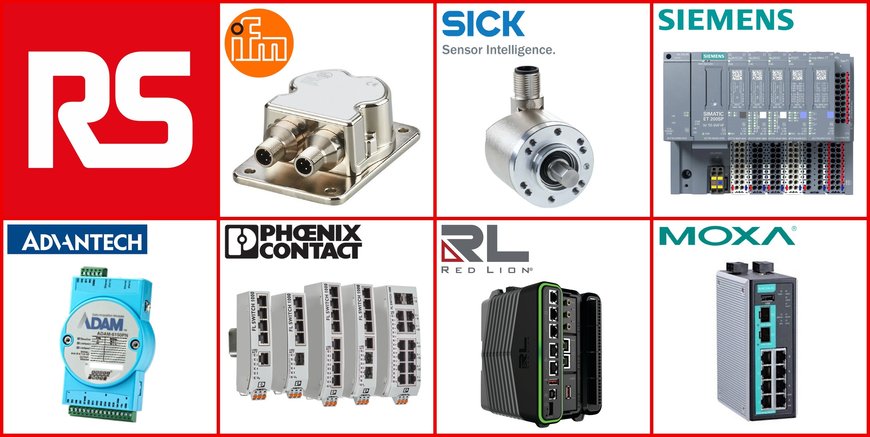RS Helps Energy and Utilities Organizations Leverage Industry 4.0
RS offers an extensive range of Industry 4.0 technologies designed to help energy and utility organizations overcome pervasive challenges, including downtime, skilled labor shortages, and inefficiencies, and achieve ambitious modernization goals.

RS, a trading brand of RS Group plc, a digitally enabled global distributor of product and service solutions for industrial customers, offers an extensive range of Industry 4.0 technologies designed to help energy and utility organizations overcome pervasive challenges and achieve ambitious modernization goals.
Operating challenges including downtime, skilled labor shortages, and inefficiencies affect every industrial market segment, and their cumulative effects can be disastrous. For example, the average manufacturer experiences 800 hours of equipment downtime a year, which costs industrial organizations almost $1.5 trillion a year — roughly 50% more than it did in 2019–2020 — due to spiraling inflation and production lines running at higher capacities. In addition, the manufacturing skills gap in the U.S. is projected to result in 2.1 million unfilled jobs by 2030, which could cost the industry more than $1 trillion in 2030 alone.
In response, a growing number of industrial organizations are embracing Industry 4.0 trends — ranging from electrification, digitalization, and automation to remote condition monitoring and predictive maintenance — by integrating smart technologies, such as smart meters, IIoT sensors, asset management solutions, and industrial data communications solutions. While still undeniably innovative, many of these smart Industry 4.0 technologies are rapidly maturing and widely proven to help industrial organizations with even the harshest operating environments achieve significant process optimization, efficiency, productivity, quality, safety, and profitability improvements that can mitigate the impacts of these persistent challenges.
However, although downtime, skilled labor shortages, and inefficiencies affect every sector in the industrial market, the intricacies of each sector — ranging from goals, investments, and consumer demands to environmental hazards and industry standards — influence the impact of these ubiquitous challenges as well as the Industry 4.0 trends and technologies best suited for overcoming them. For example, the Industry 4.0 trend towards electrification is having a tremendous impact on the energy and utilities sector, as it will have to both follow suit to stay sustainable — adopting and investing in renewable energy to meet growing market demand — as well as significantly increase supply to electrify the massive number of processes in virtually every market sector that are transitioning to greener electric power from other energy sources.
Because of this, the energy and utilities sector is actively embracing Industry 4.0 trends and heavily investing in enabling technologies that can ready its aging infrastructure for the monumental modernization and expansion tasks that lie ahead and execute them with the workforce available.
RS offers an extensive range of Industry 4.0 technologies designed to help energy and utility organizations overcome these pervasive challenges and achieve ambitious modernization goals. Popular solutions include:
Remote condition monitoring solutions, like smart meters and sensors equipped with IO-Link communication capabilities, that help energy and utility companies gather more actionable data and access, analyze, and leverage it more efficiently. Benefits for energy and utility companies include sparing employees from traversing sprawling facilities and installations rife with safety hazards, freeing available employees up for more complex tasks, reducing labor costs, and supporting predictive maintenance strategies that eliminate unplanned downtime. These solutions also enable smart grids capable of managing and balancing the intermittent flow of renewable energy and integrating it into the electrical grid, which boosts energy efficiency and reliability, makes renewable energy more accessible, which in turn helps fuel adoption, and can even help reduce energy costs. Examples include the JN2201 inclination sensor from ifm efector and SICK AHS/AHM36 IO-Link absolute encoders.
Asset management solutions, like PLCs and edge and cloud computing systems. PLCs, for instance, have long been the crux of automated process systems — using data received from I/O modules and systems to send programmed responses based on those sensor inputs to output devices capable of affecting the process, such as pumps, heaters, and actuators. I/O modules typically transmit information from a single I/O point to a PLC, while I/O systems typically feature higher channel densities and additional features, like diagnostics, ideal for more complex application environments, and both — along with PLCs — are widely available in ultra-rugged form factors well suited for use in harsh energy and utility application environments. Examples include the Siemens Simatic ET 200SP MultiFieldbus I/O system and Advantech ADAM-6000 Series remote I/O modules.
Industrial data communications products, like switches, gateways, routers, and protocol converters, which facilitate the secure, real-time transmission of data that fuels optimization, productivity, efficiency, quality, safety, and profitability improvements and are critical enablers for all these other advanced Industry 4.0 technologies. Examples include Phoenix Contact's FL 1000 Series unmanaged switches, Red Lion's FlexEdge modular IIoT gateways, and Moxa's EDR-810 Series industrial routers.
“RS is well experienced in helping energy and utility organizations navigate the complexities of industrial market challenges, ranging from downtime and skilled labor shortages to inefficiencies,” said Mark Russell, Technical Application Support Manager at RS. “We help organizations embrace Industry 4.0 trends — including electrification, digitalization, automation, remote condition monitoring, and predictive maintenance — and implement advanced Industry 4.0 technologies, ranging from sensors and IIoT networks to asset management solutions and industrial data communications products. In addition, our experienced customer support — which spans the design, build, and maintenance phases — is backed by the breadth and depth of our product offerings and enhanced by our omnichannel ease of doing business.”
www.rsgroup.com

